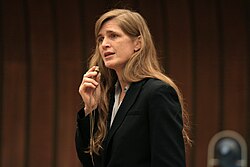By David EdendenA risky end-game
one of the very few articles that provides a reasonable summary of the issues that divide Macedonia and Greece over the "what's in a name issue". I like Ed's description of "ethnic Macedonian" minority in Greece rather than the pejorative "slav Macedonian". I was also pleasantly surprised that he even mentioned that Macedonians in Greece "still lack fundamental rights".
Now I really could complain that Ed's former employer, the International Crisis Group (more) (more) should have been covering the plight of Macedonians in Greece years ago, but I won't because I am in a charitable mood today
Oh Ed ... sorry for the nasty comments concerning your op-ed ... about ... you know who!
International Herald Tribune:
 The dispute between Greece and Macedonia over the latter's name jeopardizes this week's NATO summit in Bucharest - and Balkan stability. Failure by Macedonia to start the process of joining NATO could open a political crisis in the small, divided country that could ultimately threaten the peace agreement that halted a burgeoning civil war in 2001.
The dispute between Greece and Macedonia over the latter's name jeopardizes this week's NATO summit in Bucharest - and Balkan stability. Failure by Macedonia to start the process of joining NATO could open a political crisis in the small, divided country that could ultimately threaten the peace agreement that halted a burgeoning civil war in 2001.
This in turn would create shock waves for neighboring Kosovo. With Serbia still defiantly against Kosovo independence, and with its ally Russia adamant about halting NATO expansion, landlocked Macedonia's fate at Bucharest is crucial.
U.S.-led diplomacy continues, but time is nearly up. The Greek government of Prime Minister Kosta Karamanlis, clinging to the narrowest of Parliamentary majorities, has gone on a full-court press aimed not only at forcing Macedonia to change its name, but dictating that name as well.
For its part, Skopje 's rightist government has gone out of its way to provoke Athens on symbols, renaming the country's airport after Alexander the Great. Prime Minister Nikola Gruevski, like his counterparts in Athens, sees domestic political benefit from taking a hard line on the name.
But if Macedonia is left behind as its neighbors Albania and Croatia join NATO, Gruevski may eventually see his short-term calculation overwhelmed by forces outside of his control. Only with great reluctance has Gruevski indicated his willingness to join the moderate President Branko Crvenkovski in accepting a name change.
While Greece and Macedonia have both behaved irresponsibly, their concerns are not irrational. Macedonians and Greeks have their own legacy of conflict. The Greek civil war saw subversive attacks launched from Macedonian soil, and ended with tens of thousands of ethnic Macedonians fleeing their homes. Those Macedonians who stayed behind, like other minorities in Greece, still lack fundamental rights. Property issues have never been fully resolved. (My Emphasis - David Edenden)
There is no time to debate whose claims have greater merit. What matters is that the dispute engages core U.S. and European interests in a region where NATO troops are still deployed. Allies must seize the remaining hours to forge a deal.
London, Berlin, Paris and other EU capitals need to join with Washington and send an urgent message to Macedonia and Greece: Accept the compromise name proposed by the United Nations - "Republic of Macedonia (Skopje)" - or accept the blame.
Without a unified position, the end-game could well lead to a deadlock. The allies must convince Athens that protecting Greek heritage by denying its neighbor membership in NATO is a Pyrrhic victory.
If Greece continues to move toward a veto, then all NATO members - not just the United States - need to make it unmistakably clear that Greece will bear a heavy political price.
Rescuing both sides, and NATO, from the impending crack-up, will require intensified pressure across the Atlantic. Failure to bring Macedonia into NATO now will be a failure for American diplomacy, UN mediation and European security, which will burden the alliance for years to come.
- EDWARD P. JOSEPH worked for more than a decade in the Balkans, including duty with NATO and the International Crisis Group.

![[NATO Expansion Should Continue]](http://s.wsj.net/public/resources/images/OB-BF164_it_rum_20080327181335.gif)




